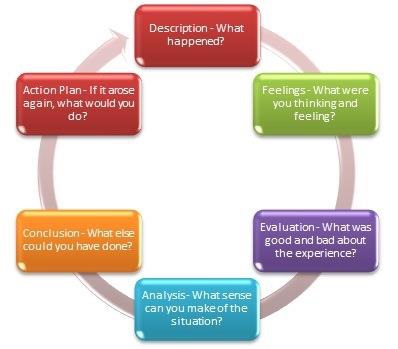A Coaching Power Tool Created by Jane Thompson-Gilliam
(Executive Coach, UNITED STATES)
It is not sufficient simply to have an experience in order to learn. Without reflecting upon this experience it may quickly be forgotten, or its learning po-tential lost. It is from the feelings and thoughts emerging from this reflection that generalisations or concepts can be generated. And it is generalisations that allow new situations to be tackled effectively. Gibbs (1988)
Introduction:
How often do we take a breath, pause and really examine an activity or event. Hold it up to the light and work though in a systematic and rigorous (or even in a light touch manner) what went well and what we would want to repeat and what we would chose to do differently next time. The pace at which we work and live our lives is furious. All too often we finish one task or project and immediately spring into action on to the next. Within organizations action and drive for results is highly valued and rewarded. The changes and advances in technology enable and enhance our connectedness and availability however it can also ensure we remain “on” and “doing” for a the majority of our waking hours.
To stop and reflect on where we are and how we got there enables us to where necessary adjust our course/actions or reactions, celebrate our wins and acknowledge the distance and progress we have made. We have the power to chose what we would absolutely do again in the same way and other actions we may chose to do differently next time. It can jolt us out of our auto pilot and ensure we are mindful, present and continuously learning and developing. It can aid us to squeeze the learnings from our experiences to our personal benefit and gain. The reflection process can also serve to re-energize and refuel our inner energy reserves and drive when we recognize our successes and feel in charge of our choices to be or act differently.
To deflect is to keep a question, statement or situation from affecting us. Our intent can be to protect and insulate ourselves. Visualize a ball bouncing or deflecting off a shield, it never has an impact and does not make contact. The intent of deflection is often to prevent impact and potential injury. The key word is “contact”. In relation to self-reflection deflecting is a way of not allowing a question (posed by other person or indeed by the person to themselves) to “make contact”. To penetrate the shield and make contact with ones mind, soul & heart. To cause the person to pause and consider.
Deflection can be either intentional or unintentional and unconscious. We are often trying to avoid the anticipated and perceived injury, discomfort, unease or pain. Additionally we could just be in the habit and rhythm of life and doing. We can be on the “train” and on autopilot, so immersed in the journey and delivering and doing that stopping and reflecting is just not even on activity we consider. It can also be an intentional act where the person choses not to look back-wards and only face forwards for a range of personal reasons. Sometimes the anticipation of the perceived injury, discomfort, unease and pain may not translate into reality and indeed may actu-ally be an empowering, vital and positive experience.
Through supporting the individual with active listening and powerful questions one can en-courage the person to recognize their own deflections and understand their motivations and be-haviors. By doing so the person can then then determine if this is serving them and their per-sonal aims and goals. By deflecting the person can place obstacles in their path and not gain the personal insights and clarity that will move them forward towards their goals.
Definitions according to the Merriam-Webster Dictionary:
Self–reflection
careful thought about your own behavior and beliefs
Deflection
to keep (something, such as a question) from affecting or being directed at a person or thing
Graham Gibbs (1988) has described a simple, idealized model of the iterative process of reflec-tion in which there are six main stages, through which the reflective learner progresses cycli-cally.
 Coaching Application:
Coaching Application:
I was partnering with a client who had been working towards delivering a huge public event that had enormous profile. It was critical that he deliver well upon this and that it was publicly well received. A few days after the event he sent me a few articles reviewing the event and all were extremely positive. At our next session we discussed the event. When I asked him how he had celebrated he looked at me blankly. Equally when I asked what his reflections were on the event and what he would do the same way again and what he would do differently he looked even more blankly at me. His response was we are already onto the next event and you are only as good as your last showing.
He explained action was key and that both him and his team were onto the next task. He started talking abut the next demands and task. Deftly deflect-ing my question.
After additional questions, silences and space he actually paused – almost as if he were battling the knee jerk response to just keep moving and doing – and I could almost see the draw-ing in of breath and exhaling. What followed was a rich conversation about how he was going to acknowledge his/his teams achievement and he then started mindfully “mining” the experience for learnings. He physically looked lighter in his facial expressions and when I asked him how he was feeling he said energized and excited. Indeed more prepared and positive about the next task and event.
The mere act of pausing, acknowledging and reflecting had provided him with energy and drive versus deflecting and continuing to “do”. He took the same this question to his team and it yielded powerful insights for the next event.
Coaching questions:
